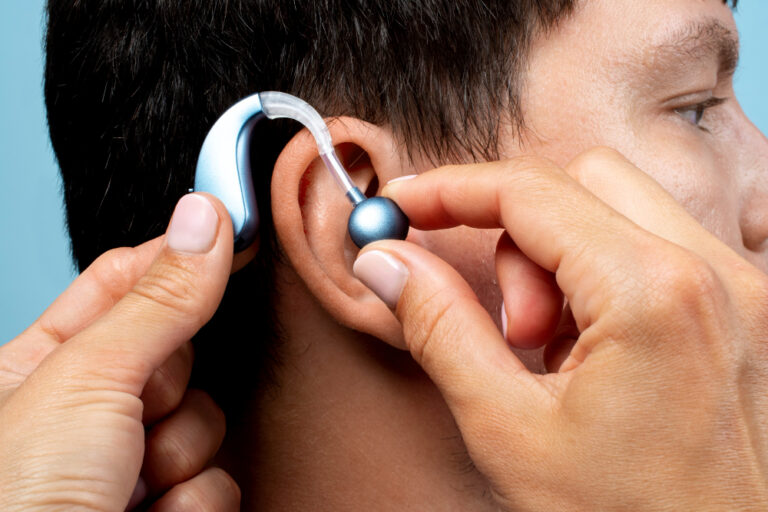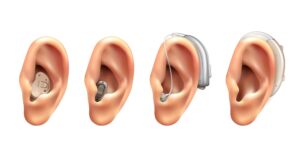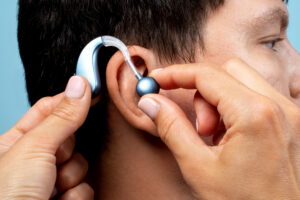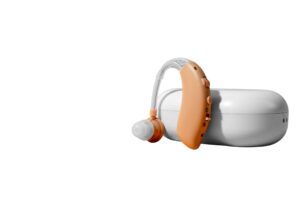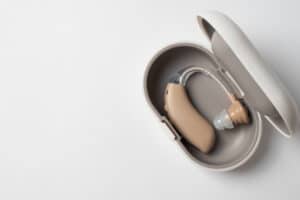Hearing loss can subtly impact every interaction, from family conversations to public lectures. If you’re realizing that voices in crowded rooms are becoming unintelligible or you’re asking loved ones to repeat themselves more often, it might be time to consider a hearing aid. Knowing how to choose a hearing aid isn’t just about restoring hearing. It’s about reclaiming the quality of life you deserve.
● Understanding Different Types of Hearing Aids
When figuring out how to choose a hearing aid, the variety of options available can seem overwhelming, but understanding the basic types can simplify your decision. Hearing aids generally fall into three categories: Behind-the-Ear (BTE), In-the-Ear (ITE), and Canal aids, each suitable for different levels of hearing loss and lifestyle preferences.
Behind-the-Ear (BTE)
These devices rest comfortably behind the ear while amplifying sound through a tube that connects to an earpiece. BTE aids are versatile and can be used for almost all types of hearing loss. They are particularly noticeable, yet easy to handle, making them a good option for the elderly or those with dexterity concerns.
In-the-Ear (ITE)
All components of ITE hearing aids are contained within a single shell that fits in the outer part of the ear. They are less visible than BTE models and easy to use with the telephone, making them suitable for mild to moderate hearing loss.
Canal Aids
These are the smallest and most discreet options, fitting either in the ear canal itself (In-the-Canal, ITC) or deeper within the canal (Completely-in-Canal, CIC). While offering aesthetic appeal and being less susceptible to wind noise, they may be challenging to adjust due to their small size, which makes them better suited for users with mild to moderately-severe hearing loss.
Each type of hearing aid offers unique advantages, and the right choice depends largely on your level of hearing impairment, comfort, and personal lifestyle.
● Key Features to Consider in a Hearing Aid
How to choose a hearing aid? Selecting the right one goes beyond choosing a type. It’s also about considering the features that can enhance your hearing experience. Here are several key features to keep in mind as you compare different models:
Directional Microphones
These allow the hearing aid to focus on sounds coming from in front of you, while reducing noise from other directions. This feature is particularly useful in noisy environments, as it helps enhance the clarity of speech.
Noise Reduction
All modern hearing aids include some form of noise reduction technology. This feature is designed to lessen background noise, making it easier to hear conversations clearly.
Feedback Suppression
This technology reduces feedback, the annoying whistling sound that occasionally occurs with hearing aids. Feedback suppression improves comfort and listening quality by preventing these disturbances before they start.
Digital Signal Processing (DSP)
DSP is used to analyze the sound signals and makes it possible to adjust the hearing aid settings to better match your hearing loss pattern. This technology can improve sound quality and speech understanding in various environments.
Wireless Connectivity
Many hearing aids now come with Bluetooth technology, allowing them to connect directly to smartphones, televisions, and other devices. This feature can greatly enhance your ability to participate in phone conversations, enjoy music, and hear audio from electronic devices directly through your hearing aid.
Rechargeable Batteries
For those tired of constantly changing tiny batteries, rechargeable hearing aids offer a convenient alternative. Simply charge your hearing aids overnight, and they’re ready to use all day.
Tinnitus Masking
If you experience ringing in your ears, known as tinnitus, some hearing aids offer a masking feature that generates a sound to counteract this ringing, providing you with significant relief.
Remote Control Options
Some models come with remote controls or apps that allow you to adjust settings on your hearing aid without having to touch it. This can be especially useful for users who prefer more control over their hearing aid settings or who find the small size of the devices difficult to manage.
As you evaluate hearing aids, consider which features align with your lifestyle, your level of hearing loss, and the situations in which you find hearing most challenging. With the right combination of type and features, your hearing aid will not only improve your ability to hear but also enhance your overall quality of life.
● How to Choose a Hearing Aid: Assess Your Hearing
Identifying the right hearing aid requires understanding your specific hearing requirements. Here are steps to guide you through evaluating your hearing aid needs effectively:
Consult a Professional
Start with a visit to an audiologist or a hearing specialist. These professionals can conduct a thorough hearing test, known as an audiogram, to pinpoint your levels of hearing loss. The results will help determine which hearing aid features and styles are most appropriate for your situation.
Consider Your Daily Activities
Reflect on the environments where you often find hearing challenging. Do you struggle to hear conversations in noisy restaurants? Do you need better sound clarity when attending meetings or watching TV? Understanding where you need the most help can guide you to choose a hearing aid with the right features, like directional microphones or wireless connectivity.
Lifestyle Compatibility
Your lifestyle plays a crucial role in selecting a hearing aid. If you are active, you might prefer a more durable, water-resistant model. For those who enjoy technology, hearing aids with advanced features like Bluetooth connectivity might be appealing.
Manual Dexterity and Visual Abilities
Consider your ability to handle small devices. If you have difficulty with small buttons or changing batteries, look for hearing aids that are easy to manage or come with rechargeable batteries and remote control capabilities.
Aesthetic Preferences
Some people are sensitive about the visibility of their hearing aids. If this concerns you, consider smaller, more discreet models like in-the-canal or completely-in-canal options.
Budget Considerations
Finally, assess your budget. Hearing aids are a significant investment, and prices vary widely based on features and types. Determine how much you are willing to spend and what features are must-haves within your budget range. Also, check if your insurance covers any costs or if there are financing plans available that can make the purchase more manageable.
● Where to Purchase Hearing Aids
Once you’ve determined the type of hearing aid that best suits your needs, the next step is deciding where to buy it. Here are some options and considerations for purchasing your hearing aid:
Local Audiologists and Hearing Clinics
Purchasing hearing aids from a local audiologist or hearing clinic is one of the most common methods. These professionals not only provide the hearing aids but also offer fitting services, adjustments, and follow-up care. This option ensures that your hearing aids are customized to your specific hearing profile and needs.
Online Retailers
With advances in technology, buying hearing aids online has become more accessible. Many online platforms offer high-quality hearing aids at potentially lower prices than physical stores. When shopping online, look for retailers that provide good customer support, have favorable return policies, and offer assistance with setup and maintenance.
Big Box Retailers
Some large retail chains now offer hearing aids. These stores sometimes have hearing specialists available to perform basic hearing tests and help with initial fittings. Prices can be competitive, making this a good option for budget-conscious consumers.
Direct from Manufacturers
Buying directly from the manufacturer can sometimes allow for more customization options and access to the latest models. Ensure that the manufacturer offers sufficient customer support and has service centers or partners locally.
Considerations for Purchasing Hearing Aids
- Expert Care: Opting for a hearing aid prescribed by a licensed audiologist is crucial. They are equipped to assess your hearing thoroughly and recommend a device that addresses your specific hearing challenges. This expert guidance ensures that your hearing aid is not just a device but a personalized solution tailored to improve your daily life.
- Warranty and Service: Check what the warranty covers and for how long. It’s also important to understand what services are included, such as fitting adjustments, routine maintenance, and repairs.
- Trial Periods: Many places offer trial periods for hearing aids, allowing you to return them if they do not meet your expectations. This is crucial, as it gives you the opportunity to test the hearing aids in your everyday environment.
- Support and Maintenance: Ongoing support is vital. Inquire about the availability of the audiologist or specialist who can provide adjustments and troubleshooting if needed.
- Reviews and Testimonials: Research reviews and testimonials from other customers to gauge their experiences with the product and the provider. This can provide insights into the reliability and customer service you can expect.
Choosing where to buy your hearing aid is as crucial as selecting the hearing aid itself. It’s important to weigh the convenience, cost, and level of personalized service to find the best option for you.
● Ready to Hear the World Clearly? Consult a Trusted Audiologist New York’
Are you tired of missing out on conversations and asking, “What?” At Listen Hear Diagnostics in Westchester, we specialize in providing personalized hearing care tailored to your unique needs. Under the expert guidance of Dr. Emily M. Esca, our dedicated team offers comprehensive services, including advanced hearing aids in Westchester, NY, detailed hearing evaluations, and effective tinnitus management.
Whether you are figuring out how to choose a hearing aid or looking to upgrade your current device, we are committed to helping you achieve optimal hearing health. Our approach ensures that you receive not only the best technology but also care that is customized just for you.
● Why Choose to Listen Hear Diagnostics for Your Hearing Aid Needs?
- Personalized Care: We understand that each individual’s hearing loss is unique. Dr. Esca and our team spend time understanding your lifestyle and hearing challenges to recommend the best hearing solutions.
- Advanced Technology: Our range of hearing aids includes the latest models from top manufacturers, equipped with features that improve your hearing experience in various environments.
- Full Spectrum of Services: From initial evaluations to hearing aid fittings and ongoing maintenance, we provide all the services you need under one roof.
Take the first step towards clearer hearing and a better quality of life. Visit us at Listen Hear Diagnostics for a consultation with our audiologist and tinnitus specialist Westchester. Let us guide you through the process with the care and expertise you deserve. Your journey to better hearing starts here! Book your appointment now!

